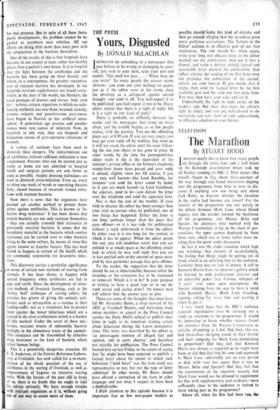Yours, Disgusted
THE PRESS .
By DONALD McLACHLAN
There is probably no difficulty between the reader and his newspaper that crops up more often; and the trouble begins, as so few people realise, with the posting. You see the offending piece, say, at 8.30 a.m. If you are very angry, you may get your reply off by midday; but, even so, it will not reach the editor until the issue follow- ing the one you object to has gone to press. In other words, by the time the correspondence editor reads it (he is the equivalent of the minister's private office or the bishop's chaplain), twenty-four hours have passed and your reply is already slightly vieux jeu. Of course, if you are very well known—like Lord Boothby, for instance—you send the letter round by hand; or if you are much feared—as Lord Goodman, the solicitor, used to be—you dictate the letter over the telephone and send the signature later.
Nor is that the end of the trouble. If your wish to chastise the editor has been stronger than your wish to correct what he published, one of two things has happened. Either the letter is too long—perhaps longer than the piece that gave offence—or it is too rude for publication without a reply underneath it from the editor. In either case it is too long for the context in which it has to appear. When the editor points this out, you will doubtless retort that you are entitled to as much space as the offending article had; to which he may well reply that you are in fact entitled only to the amount of space occu- pied by that particular passage that gave offence.
To the reader, the suggestion that his letter should be cut is objectionable, because either the invective or the corrective has to be weakened or removed. Which is it to be? Is your purpose in writing to have a good rage or to see the truth stated and justice done? An honest man will seldom find the answer easy to give.
These are some of the thoughts that must have led Mr Alexander Burns, a shop steward of the AEU $ Vauxhall Motors, and forty-nine trade union members to appeal to the Press Council against the Daily Mail's refusal to publish their letter in reply to its trenchant leading article about behaviour during the Luton demonstra- tions. This letter was described by the editor as 'an extravagant mixture of alleged fact and opinion, and in parts abusive,' and therefore not suitable for publication. The Press Council backed him up last Friday to the extent of saying that 'he might have been expected to publish a factual letter about the extent to which such behaviour ["mob fever" was the term used] was representative or not, but not the type of letter submitted.' In other words, Mr Burns should have offered a correction of the facts in sober language and not what I suspect to have been a demi-diatribe.
I drily attention to this episode because it is important that as few newspaper readers as
possible shouldfinake this kind of mistake and then go around alleging that the so-and-so press
never publishes corrections. The 'Letters to the Editor' column is an effective part of our free institutions. The rule should be: when angry, write your long and abusive letter to the editor marked not for publication; then put it into a drawer, and write a shorter, strictly factual and reasonable letter marked for publication; then reflect whether the sending of the first letter may not prejudice the publication of the second; editors are only human. If you decide that it might, then send the factual letter by the first available post and the rude one two posts later. You may then have your cake and eat it.
Undoubtedly the right to reply exists, on the reader's side. But there also exists the editor's right to select; and you are well-advised to do everything you can, short of rank appeasement, to influence selection in your favour.






























 Previous page
Previous page